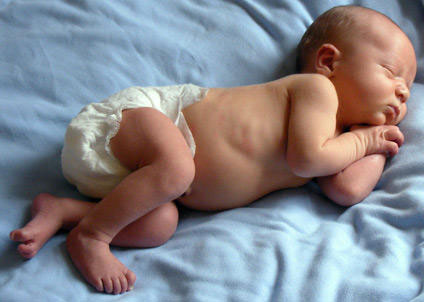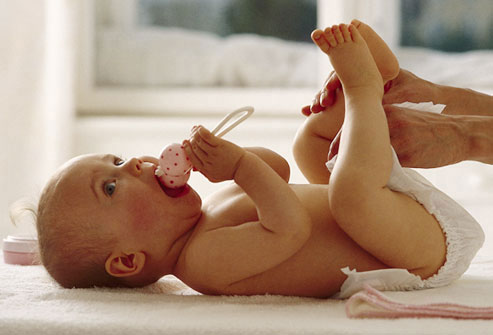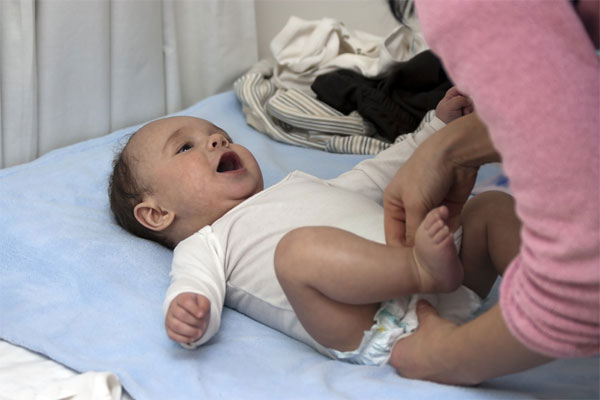Small babies and infants have to experience a lot of discomfort due to constipation. As such it is essential identify its signs in treat it immediately. Have a quick look at the common signs of Constipation is the condition when the baby has difficulty passing stool and the stool becomes compact and hard in nature. Constipation is not related to the frequency of bowel movements and there is no set parameter for the number of stools that should be passed every day. It is common for newborns and small babies to suffer from constipation and here are the signs that will help you identify this condition. In this articleCrying Due to Abdominal PainStraining and Physical DiscomfortChange in the Consistency of StoolBleeding with StoolsCauses of Constipation in BabiesSigns of Constipation in BabiesHere are some common signs of constipation in babies.Crying Due to Abdominal PainBabies and very small children have no other means of expressing physical discomfort apart from crying. As a parent you have to be alert to the verbal and non verbal signals your baby is sending out. If you notice more than usual amount of crying at the time of passing stool then it is likely that your baby is suffering from constipation.Straining and Physical DiscomfortIf you see your child straining during stool ejection then it is a sign that there is a problem with the bowel movement. Usually babies suffering from this condition draw up their legs towards the abdomen with angry red faces. This is the physical indication that they are having issues in passing stool and are constipated. Ignoring this problem will only make it worse as constipation intensifies if left unattended.Change in the Consistency of StoolThough there are scientifically set parameters for how a healthy baby’s stool should look like there are certain general concepts. Newborns tend to pass potty 5 to 6 times a day with the colour and consistency of mashed peas and mustard. Babies who are on to solid food pass potty which is slightly harder. In a newborn passing stool only once or twice a day and that too hard ones is a sure sign of constipation. Any change in the stool frequency of your kid should be closely monitored.Bleeding with StoolsAs a parent you should frequently inspect the colour, consistency and odour of stools passed by your baby as this is how you will gain information about your baby’s digestive health. In case you see drops or streaks of blood along with stools then it is a red alert for constipation. The lining on the anus of newborns is very tender and delicate and the slightest strain can cause bleeding. This condition also causes a lot of pain to the baby so act immediately when you see bleeding. Take your baby to a child specialist to get the problem resolved.Causes of Constipation in BabiesAs the digested food travels down the intestine there is absorption of water and nutrients and the waste material is formed into stool. For the stool to remain soft there should be enough water in the waste material and the rectal and the intestine muscles should contract properly. In case there is too little water in the waste material or there is too less muscle movement, constipation happens. Stool held up inside the body can be very uncomfortable for little children and often it becomes a recurring problem for kids.Passing hard stools through narrow rectums often causes bleeding which increases the chance of infection. The sudden switch to new food groups also causes constipation as does certain milk formulas. In case a baby is formula fed it is always advisable to feed an extra portion of water per day after consulting a paediatrician.Though drinking water and adding dietary fibre to the child’s diet are the easily available solutions it is always advisable to get proper medical help to get constipation sustainably cured. Doctors also recommend appropriate amounts of physical movement to work up the rectal and intestinal muscles and avoid constipation.What are the causes of constipation in babies? What are the early signs of constipation in babies? How to treat constipation in babies? Discuss here.
 Small babies and infants have to experience a lot of discomfort due to constipation. As such it is essential identify its signs in treat it immediately. Have a quick look at the common signs of
Small babies and infants have to experience a lot of discomfort due to constipation. As such it is essential identify its signs in treat it immediately. Have a quick look at the common signs of Constipation is the condition when the baby has difficulty passing stool and the stool becomes compact and hard in nature. Constipation is not related to the frequency of bowel movements and there is no set parameter for the number of stools that should be passed every day. It is common for newborns and small babies to suffer from constipation and here are the signs that will help you identify this condition.
Signs of Constipation in Babies
Here are some common signs of constipation in babies.
Crying Due to Abdominal Pain
Babies and very small children have no other means of expressing physical discomfort apart from crying. As a parent you have to be alert to the verbal and non verbal signals your baby is sending out. If you notice more than usual amount of crying at the time of passing stool then it is likely that your baby is suffering from constipation.
Straining and Physical Discomfort
If you see your child
straining during stool ejection then it is a sign that there is a problem with the bowel movement. Usually babies suffering from this condition draw up their legs towards the abdomen with angry red faces. This is the physical indication that they are having issues in passing stool and are constipated. Ignoring this problem will only make it worse as constipation intensifies if left unattended.
Though there are scientifically set parameters for how a healthy
baby’s stool should look like there are certain general concepts. Newborns tend to pass potty 5 to 6 times a day with the colour and consistency of mashed peas and mustard. Babies who are on to solid food pass potty which is slightly harder. In a newborn passing stool only once or twice a day and that too hard ones is a sure sign of constipation. Any change in the
stool frequency of your kid should be closely monitored.
As a parent you should frequently inspect the colour, consistency and odour of stools passed by your baby as this is how you will gain information about your baby’s digestive health. In case you see drops or streaks of blood along with stools then it is a red alert for constipation. The lining on the anus of newborns is very tender and delicate and the slightest strain can cause bleeding. This condition also causes a lot of pain to the baby so act immediately when you see bleeding. Take your baby to a child specialist to get the problem resolved.
Causes of Constipation in Babies
As the digested food travels down the intestine there is absorption of water and nutrients and the waste material is formed into stool. For the stool to remain soft there should be enough water in the waste material and the rectal and the intestine muscles should contract properly. In case there is too little water in the waste material or there is too less muscle movement, constipation happens. Stool held up inside the body can be very uncomfortable for little children and often it becomes a recurring problem for kids.
Passing hard stools through narrow rectums often causes bleeding which increases the chance of infection. The sudden switch to new food groups also causes constipation as does certain milk formulas. In case a baby is formula fed it is always advisable to feed an extra portion of water per day after consulting a paediatrician.
Though drinking water and adding dietary fibre to the child’s diet are the easily available solutions it is always advisable to get proper medical help to get constipation sustainably cured. Doctors also recommend appropriate amounts of physical movement to work up the rectal and intestinal muscles and avoid constipation.
What are the causes of constipation in babies? What are the early signs of constipation in babies? How to treat constipation in babies? Discuss here. 











 Small babies and infants have to experience a lot of discomfort due to constipation. As such it is essential identify its signs in treat it immediately. Have a quick look at the common signs of Constipation is the condition when the baby has difficulty passing stool and the stool becomes compact and hard in nature. Constipation is not related to the frequency of bowel movements and there is no set parameter for the number of stools that should be passed every day. It is common for newborns and small babies to suffer from constipation and here are the signs that will help you identify this condition.
Small babies and infants have to experience a lot of discomfort due to constipation. As such it is essential identify its signs in treat it immediately. Have a quick look at the common signs of Constipation is the condition when the baby has difficulty passing stool and the stool becomes compact and hard in nature. Constipation is not related to the frequency of bowel movements and there is no set parameter for the number of stools that should be passed every day. It is common for newborns and small babies to suffer from constipation and here are the signs that will help you identify this condition.

















